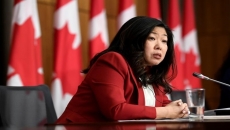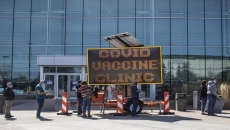More damaging earthquakes can be expected more often in northern British Columbia as fracking oil and gas wells increases pressure underground, says newly published research.
"It makes earthquakes more common and it makes larger ones more common," said Allan Chapman, an independent researcher and formerly senior scientist with the B.C. Oil and Gas Commission.
"There appears to be a fairly strong relationship between this cumulative water loading underground and the magnitude of an event."
Chapman said his study suggests that homes and infrastructure in northern B.C. could be at risk from earthquakes and that current government safeguards are inadequate.
"For many of these large events there may be no warning."
Chapman looked at the Montney field near Fort St. John, B.C. For years, that area has seen intensive oil and gas development using fracking, which injects high-pressure fluids deep underground to fracture rocks and release oil and gas.
That technique has become increasingly associated with earthquakes. In parts of the Montney, a total of 439 earthquakes up to 4.6 magnitude were associated with fracking between 2013 and 2019.
Previous research has linked the pressure at which the fluids are injected to the resulting temblor.
Chapman looked at the total volumes of water injected wells within five kilometres of an earthquake epicentre. He found that areas where water volumes built up over time — sometimes from several different companies — were associated with stronger magnitudes of at least 3.0, enough to be felt on the surface.
The number of earthquakes also increased.
One part of the Montney generated about 20 earthquakes when one million cubic metres of fluids were pumped underground. That same area registered more than 160 events when injection grew to 3.5 million cubic metres.
"It makes the earthquakes more common and it makes the large ones more common," Chapman said.
He noted that fracking is expected to increase in the Montney. Many sites only have four wells on a pad.
"At full development, you're expecting to see 20 or 30 wells on a pad. What's going to happen if the amount of fracking rises substantially?"
In a statement from spokeswoman Lannea Parfitt, The B.C. Oil and Gas Commission criticized Chapman's peer-reviewed work.
"Our geological and engineering experts have concluded it is based on a number of unproven assumptions or incomplete consideration of the factors cited," the commission said in an email.
The commission said the paper didn't account for variation in rock strata, fault types and local stresses. It called Chapman's conclusions "speculation."
"Our geologists and seismic experts use sound, peer-reviewed research, data, and predictive modelling to understand, regulate and mitigate seismic activity," it said.
B.C. and Alberta have instituted what's called a "traffic light" approach to manage risk. Companies are expected to reduce pumping pressure and volume once light earthquakes are felt and to stop completely as they increase.
But Chapman points out four of the region's five biggest recent earthquakes — all over magnitude 4.0 — weren't preceded by any warnings.
"There was no precursor," he said.
"Magnitude 4 is a big event, shaking the ground for 30 kilometres. If you had one within a couple kilometres of your house, you'd be worried about damage."
Fracking has already induced earthquakes in China rated at 5.3, Chapman's study says.
"There is no upper limit."
Fort St. John, with 20,000 residents, felt five earthquakes between 2013 and 2019. The largest was rated at 4.2.
The region's bridges and dams could also be vulnerable, Chapman said.
He is joining other researchers who have already called for a no-fracking zone in areas with susceptible geology, homes and buildings.
"We do need to look at places that are too high-value. They need to have a no-frack zone around them."






